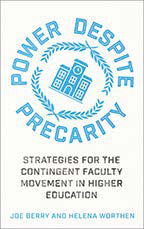
Joe Berry and Helena Worthen
Pluto Press, 2021, 320pp;
ISBN: 978-0745345529.
By Sarika P. Bose
Joe Berry and Helena Worthen’s book, Power Despite Precarity: Strategies for the Contingent Faculty Movement in Higher Education, has been published as part of Pluto Press’s series on workers’ movements, “Wildcat: Workers’ Movements and Global Capitalism”. Berry is a long-time, prominent academic union organizer, whose previous book, Reclaiming the Ivory Tower: Organizing Adjuncts to Change Higher Education (2005), also examined the working conditions and organizing efforts of precariously employed academics. In this new study, he and Worthen make the case for abolishing precariousness in academia (and all labour) and for a recognition that “socially useful work” should be valued through decent pay and working conditions. Their ultimate objective is to ensure full citizenship within the academy for all academics.
The book explores the history and imagines the future of the academic labour force in the face of the continued destabilization and dismantling of academia through a steady creep into a gig economy. Even as the book reminds readers that bargaining is the optimal method for establishing rights and making gains for workers, it frequently expresses misgivings about the commitment and support of some American union leaders to advocate for contingent faculty. Indeed, the authors suggest that contingent faculty in the United States should be in a different union from tenured faculty. They do not however reflect upon the situation in other jurisdictions, including Canada where a clear majority of organized contract academics are members of unions and associations that also represent tenure and tenure-track academics.
The authors identify two other effective strategies for activism and organizing: the “Inside/Outside” and the “Metro” method. The Metro method involves creating organized networks across geographical regions, whether within states or between nations. The Coalition for Contract Academic Labour, which spans the United States, Mexico and Canada is one such example. The Inside/Outside model refers to grassroots efforts to, in some cases, strategize outside of existing formal union structures.
Berry and Worthen identify two main barriers to full citizenship for precarious academics in the academy, and the associated rights and working conditions: the lack of job security and academic freedom. As the majority of faculty positions become “casualized”, Berry and Worthen note that this leads to a loss of living wages, an erosion in job security, professional supports and academic freedom. Academics are left with fewer resources to deliver high-quality education — and are less able to unite to organize and work effectively within their union structures.
The focus on California’s academic labour history and strategies of activism, as well as examples of activism in other states and the province of British Columbia, allows for in-depth analysis and a solid, practical template for organizing and actions that can be adapted to other contexts. Several sections of the book are founded on a series of interviews with prominent academic union activists. The conversion of interview material into dialogue, the reporting of wider conversations about social justice, and the characterization of union and organizing history, particularly in California, as one of conflict, power struggle, evolution and transition, have created a lively, often dramatic style for a topic that might have been dry in other hands.
The storytelling style brings immediacy to the ideas, events and experiences of the mid-century beginnings of today’s activist movements in academia. A history of how some U.S. states, such as California, Illinois and Washington, made gains — and suffered losses — in union-bargained issues such as step-based salaries, seniority rights, nepotism in hiring, job security, working conditions, and last-minute hires, provides some context for where we are now. As the authors note, academic organizing work has often intersected with broader social justice issues. From the middle of the 20th century, the efforts of American academics to change higher education curricula to reflect more gender and race-diverse interests reflected larger conversations in society that sought to transform labour, voting rights and address racial injustice.
Moments of hope are reported: in California, as the organizing efforts of contingent lecturers grew more effective in the 1970s, the relationships between tenured and untenured ranks began to change positively. Lecturers began to recognize their own expertise under the leadership of union leaders. Yet, a shift away from this promise of empowerment soon emerged as the proliferation of neoliberal managerialism and increasing corporatization of academia resulted in changes to student attitudes towards critical inquiry, activism and learning.
The urgency of these issues then has only deepened today, despite many improvements to the lives of contingently employed academics. Berry and Worthen provide practical and contextual information and analysis to suggest that a social justice approach of “bargaining for the Common Good” may achieve the goal of improving conditions for contingent academics.
_______________________________________________________________
Sarika Bose teaches Victorian and Children’s Literature as a contract academic in the Department of English Language and Literatures at the University of British Columbia. She is the Chair of the UBC Faculty Association’s Contract Faculty Committee and is the immediate past Chair of the CAUT Contract Academic Staff Committee.